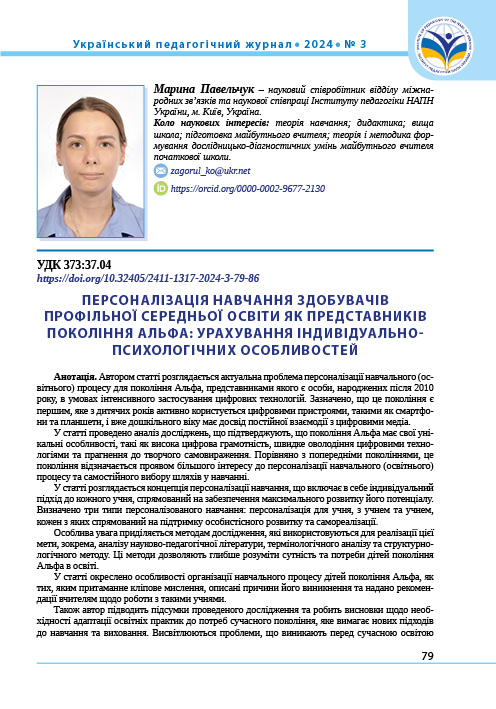Abstract
The author of the article examines the topical issue of personalization of the learning (educational) process for the Alpha generation, represented by people born after 2010, in the context of intensive use of digital technologies. It is noted that this generation is the first to actively use digital devices, such as smartphones and tablets, from childhood and has experience of constant interaction with digital media from pre-school age.
The article analyses research that confirms that Generation Alpha has its own unique characteristics, such as high digital literacy, rapid mastery of digital technologies and a desire for creative expression. Compared to previous generations, this generation is characterised by a greater interest in personalising the learning (education) process and choosing their own learning paths.
The article examines the concept of personalization of learning, which involves an individual approach to each student to ensure the maximum development of his or her potential. Three types of personalized learning are identified: personalization for the learner, with the learner and by the learner, each of which aims to support personal development and self-realization.
Special attention is given to the research methods used to achieve this goal, in particular the analysis of scientific and pedagogical literature, terminological analysis and the structural and logical method. These methods allow a deeper understanding of the nature and educational needs of children of the Alpha generation.
The article outlines the peculiarities of organizing the educational process of children of the Alpha generation as those who are characterized by clip thinking, describes the reasons for its occurrence and gives recommendations to teachers on how to work with such students.
The author also summarises the results of the study and draws conclusions about the need to adapt educational practices to the needs of the modern generation, which requires new approaches to education and upbringing. The author highlights the problems facing modern education in relation to the different ways in which the generations perceive and use technologies, and suggests the ways of solving them.
References
Apaydin, Ç., & Kaya, F. (2020). An analysis of the preschool teachers’ views on Alpha Generation. European Journal of Education Studies, 6(11), 123–141.
Bonchiș, E. (2022). Generation Alpha. A great challenge for parents and teachers. Parenting from A to Z. 83 Challenging Themes for Today’s Parents, 125–131.
Buckley, D. (2006). The Personalization by pieces framework: a framework for the incremental transformation of pedagogy towards greater learner empowerment in schools. CEA Publishing.
Drugaş, М. (2022). Screenagers or “Screamagers”? Current perspectives on Generation Alpha. Psychological thought, 15(1), 1–11.
Feiertag, J., & Berge, Z. L. (2008). Training Generation N: how educators should approach the Net Generation. Education+Training, 5(50), 457–464.
McCrindle, M., & Fell. A. (2020). Understanding Generation Alpha. McCrindle Research. https://generationalpha.com/wp-content/ uploads/2020/02/Understanding-Generation-Alpha-McCrindle.pdf
Rickabaugh, J. (2012). Learning independence continuum. CESA. (in English).
Romero, A. (2017). Colleges need to prepare for Generation Alpha. CUNY Bernard M Baruch College. https://academicworks.cuny.edu/bb_pubs/172/
Sladek, S., & Grabinger, A. (2018). Gen Z: The first generation of the 21st Century has arrived! XYZ University. https://www.xyzuniversity.com/wp-ontent/uploads/2018/08/GenZ_Final-dl1.pdf
Steyn, M. (2015). Critical Diversity Literacy: Routledge International Handbook of Diversity Studies. RefineCatch Ltd. 379–389.
Topuzov, O., Malykhin, O., Aristova, N., Popov, R., & Zasiekina, T. (2022, May). Individualized learning in the context of blended mode of the educational process in secondary school: challenges and expectations. In Proceedings of the International Scientific Conference. Volume I (Vol. 560, p. 571).
Turk, V. (2017). Understanding Generation Alpha. Hotwire Consulting: UK. https://www.hotwireglobal.com/generation-alpha
Woodman, D. (2022). Generational change and intergenerational relationships in the context of the asset economy. Distinktion: Journal of Social Theory, 1(23), 55–69.
Zahorulko, M. (2023). Introduction of personalized training in institutions of general secondary education in Ukraine. У Інноваційні тенденції підготовки фахівців в умовах полікультурного та мультилінгвального глобалізованого світу (с. 135–138).
Zahorulko, M. (2023). Personalized learning in a digital educational environment. У Психолого-педагогічні проблеми вищої і середньої освіти в умовах сучасних викликів: теорія і практика (с. 210–212).
Apaydin, Ç., & Kaya, F. (2020). An analysis of the preschool teachers’ views on Alpha Generation. European Journal of Education Studies, 6(11), 123–141. (in English).
Bonchiș, E. (2022). Generation Alpha. A great challenge for parents and teachers. Parenting from A to Z. 83 Challenging Themes for Today’s Parents, 125–131. (in English).
Buckley, D. (2006). The Personalization by pieces framework: a framework for the incremental transformation of pedagogy towards greater learner empowerment in schools. CEA Publishing. (in English).
Drugaş, М. (2022). Screenagers or “Screamagers”? Current perspectives on Generation Alpha. Psychological thought, 15(1), 1–11. (in English).
Feiertag, J., & Berge, Z. L. (2008). Training Generation N: how educators should approach the Net Generation. Education+Training, 5(50), 457–464. (in English).
McCrindle, M., & Fell. A. (2020). Understanding Generation Alpha. McCrindle Research. https://generationalpha.com/wp-content/ uploads/2020/02/Understanding-Generation-Alpha-McCrindle.pdf (in English).
Rickabaugh, J. (2012). Learning independence continuum. CESA. (in English).
Romero, A. (2017). Colleges need to prepare for Generation Alpha. CUNY Bernard M Baruch College. https://academicworks.cuny.edu/bb_pubs/172/ (in English).
Sladek, S., & Grabinger, A. (2018). Gen Z: The first generation of the 21st Century has arrived! XYZ University. https://www.xyzuniversity.com/wp-ontent/uploads/2018/08/GenZ_Final-dl1.pdf (in English).
Steyn, M. (2015). Critical Diversity Literacy: Routledge International Handbook of Diversity Studies. RefineCatch Ltd. 379–389. (in English).
Topuzov, O., Malykhin, O., Aristova, N., Popov, R., & Zasiekina, T. (2022, May). Individualized learning in the context of blended mode of the educational process in secondary school: challenges and expectations. In Proceedings of the International Scientific Conference. Volume I (Vol. 560, p. 571) (in English).
Turk, V. (2017). Understanding Generation Alpha. Hotwire Consulting: UK. https://www.hotwireglobal.com/generation-alpha (in English).
Woodman, D. (2022). Generational change and intergenerational relationships in the context of the asset economy. Distinktion: Journal of Social Theory, 1(23), 55–69. (in English).
Zahorulko, M. (2023). Introduction of personalized training in institutions of general secondary education in Ukraine. In Innovatsiy̆ni tendentsiï pidhotovky fakhivtsiv v umovakh polikulturnoho ta multylinhvalnoho hlobalizovanoho svitu (pp. 135–138). (in English).
Zahorulko, M. (2023). Personalized learning in a digital educational environment. In Psykholoho-pedahohichni problemy vyshchoi i serednoi osvity v umovakh suchasnykh vyklykiv: teoriia i praktyka (pp. 210–212). (in English).

This work is licensed under a Creative Commons Attribution-NonCommercial-ShareAlike 4.0 International License.


